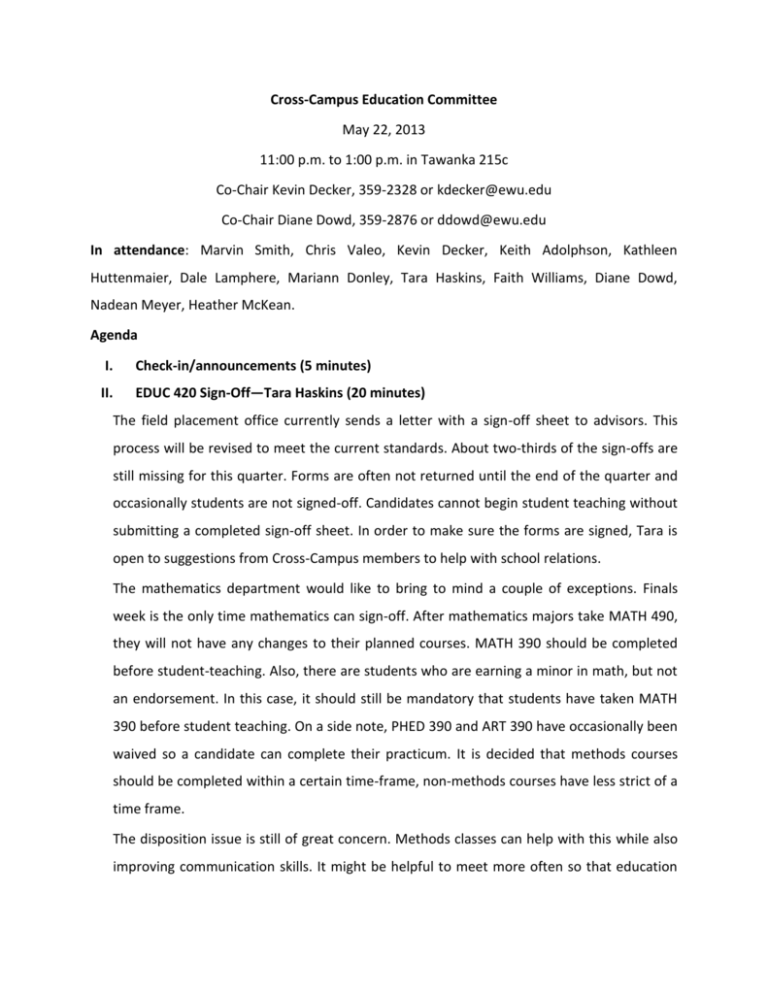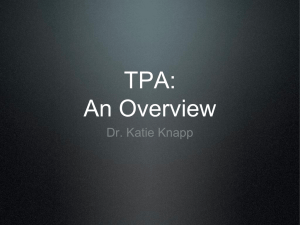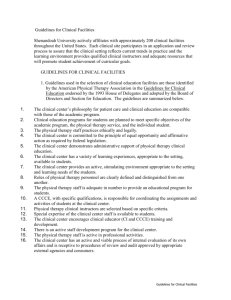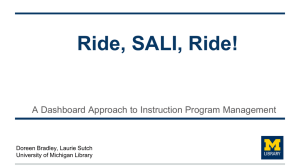May 22, 2013
advertisement

Cross-Campus Education Committee May 22, 2013 11:00 p.m. to 1:00 p.m. in Tawanka 215c Co-Chair Kevin Decker, 359-2328 or kdecker@ewu.edu Co-Chair Diane Dowd, 359-2876 or ddowd@ewu.edu In attendance: Marvin Smith, Chris Valeo, Kevin Decker, Keith Adolphson, Kathleen Huttenmaier, Dale Lamphere, Mariann Donley, Tara Haskins, Faith Williams, Diane Dowd, Nadean Meyer, Heather McKean. Agenda I. Check-in/announcements (5 minutes) II. EDUC 420 Sign-Off—Tara Haskins (20 minutes) The field placement office currently sends a letter with a sign-off sheet to advisors. This process will be revised to meet the current standards. About two-thirds of the sign-offs are still missing for this quarter. Forms are often not returned until the end of the quarter and occasionally students are not signed-off. Candidates cannot begin student teaching without submitting a completed sign-off sheet. In order to make sure the forms are signed, Tara is open to suggestions from Cross-Campus members to help with school relations. The mathematics department would like to bring to mind a couple of exceptions. Finals week is the only time mathematics can sign-off. After mathematics majors take MATH 490, they will not have any changes to their planned courses. MATH 390 should be completed before student-teaching. Also, there are students who are earning a minor in math, but not an endorsement. In this case, it should still be mandatory that students have taken MATH 390 before student teaching. On a side note, PHED 390 and ART 390 have occasionally been waived so a candidate can complete their practicum. It is decided that methods courses should be completed within a certain time-frame, non-methods courses have less strict of a time frame. The disposition issue is still of great concern. Methods classes can help with this while also improving communication skills. It might be helpful to meet more often so that education instructors and instructors from endorsement areas can address issues they have noticed. The disposition towards learning is also of concern, especially with mathematics. The sign-off process will remain the same, but the form will be adapted to include a space where methods courses can be listed and the quarter they were completed so that instructors know students are prepared before instructors sign-off on candidates’ teaching practicum. The placement of a student teacher should also be a central issue. Students are influenced by their mentor teacher and students benefit by having a successful teacher to learn from during this formative time. A list is being circulated that mentor teachers and supervisors must attend training and must have at least three years of experience. III. Program Approval Process Overview—Marvin Smith This summer, Tara and Dale will be working on materials for cooperating teachers as a first step. Hopefully this committee will consider moving to twice-a-year placements. It would allow for candidates to have a longer experience so that they will have a longer time to reflect and to have a broader experience. Contractual relationships can be written to allow for the difference in time; other programs have compensated for quarter/semester distinctions. It will be important to demonstrate to the site reviewer that the Psychology and Education Departments will continue to reflect upon their practices even after the review is completed. IV. Assessment/Accreditation—Chris Valeo (15 minutes) It is asked that instructors upload their reports to the Canvas site. The student work samples will be considered data and it will be required that data be presented in a digital format by the time of the site review. V. edTPA—Dale Lamphere (30 minutes) The winter quarter scores are just being finished; they were not available until May 16 th. There are 38 scores in all. It has become apparent that candidates struggled in the analysis phase; 2.53 is the average. The scores for student voice also need to be improved as well as the communication between student teachers and their students. Certificates will be issued once scores are improved, but not before. In order to help candidates prepare for the edTPA, a training packet will be put together. However, several candidates are doing very well as one student earned 4.22 out of 5. In order to find how you can best help your students prepare for the pedagogical exam, instructors from endorsement areas can speak with Dale or Faith to have more detailed of information about the exam. Stanford and Pearson have developed a training module. This will be provided to faculty, supervisors, and cooperating teachers. The rubrics are common knowledge, but the prompts cannot be given. VI. Year-End Report—Chris Valeo (15 minutes) It has become apparent that abilities do not always match product given in edTPA; therefore the methods of study may require some adjusting. Assessment is perhaps the most difficult piece. Students focus upon classroom management, but are not aware of how to address assessment. The project for the 2012-2013 academic year was to review standards 3,4, and 5 of the edTPA and has been completed. The last piece regarding standard 4 is to assemble a complete digital record which will be aided by the implementation of EDIE. There will be significant changes in the Dean’s office as Dean Briggs is stepping down and there will be a new Associate Dean. There will be significant changes in the Education Department as well. The requirement for a minor will be eliminated as education majors complete enough credit hours without the addition of a major. A student does still have the option of earning a minor, however. This change will be included in the 2013-2014 course catalog. At the department level, requirements for admission are being increased. Lastly, the Education Department will be hiring five field supervisors and two faculty between the end of spring quarter and the beginning of fall quarter. Every WACTE meeting has been attended and the number of attendees is increasing. Regarding volunteer opportunities, education majors have been actively involved with the Eastern Reading Council and Communities in Schools. The alliance with Communities in Schools will likely expand in the upcoming academic year. Finally, the Education Department aided with the West Valley Civics Thinkers Conference. West Valley students were asked to complete a questionnaire regarding their experience which was very positive. The conference will return in fall 2013. VII. End of formal meeting






